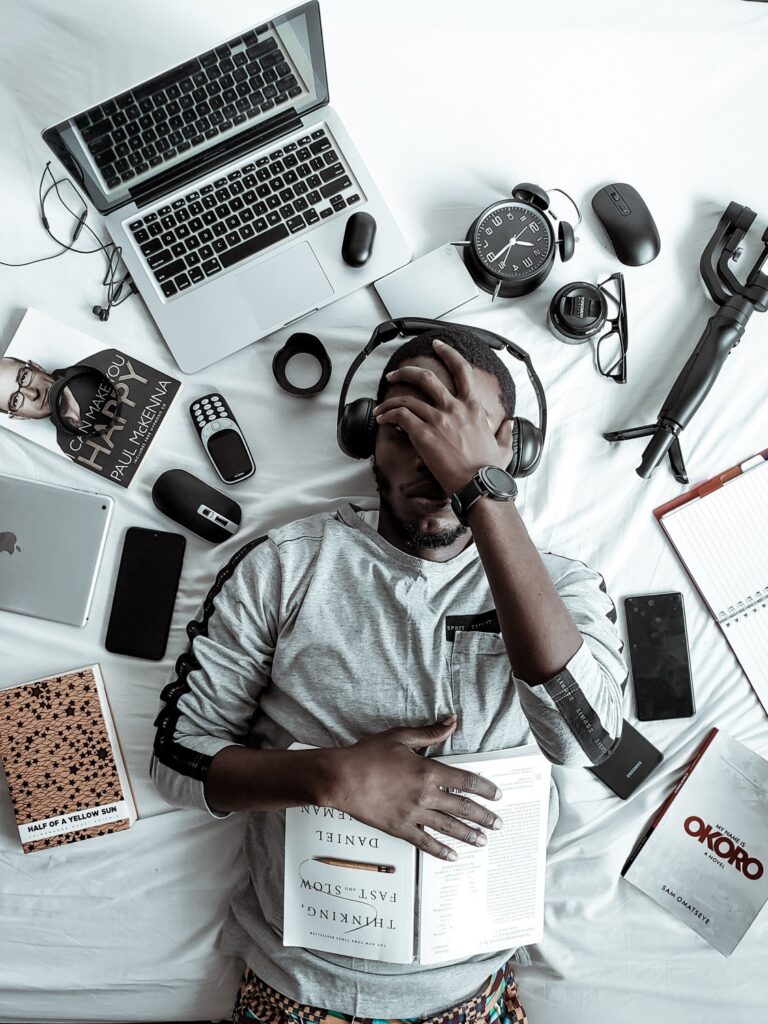I’ve written a few articles recently, all related to protecting our energy. I know myself that when my energy is low, the quality of my thoughts can falter and my decision making, impaired. Poor energy management can lead to me to feeling, in short, rubbish which is not aligned with the kind of life I want to create.
As someone who is more of an introvert and has spent over a decade working in tech, I have come to realise just how important it is go offline and wanted to share some thoughts and insights about what has worked for me.
What is the first thing you do when you wake up?
Some reports indicate as many as 69% of us check our phones within the first 5 minutes of waking. (Source: bankmycell)
What is one of the last things you do before going to sleep?
Plenty has been written and researched about the effects of using a phone or viewing a laptop/tablet screen before bed (some reports indicates as many as 87% of us). Their use impairs our body’s ability to properly recharge ready for the next day.
How often do you check your phone a day?
Stats indicate as much as 58 times a day, with 30 of those times during work hours. Each time we pick up the phone over the course of the day we are losing around 37.5 minutes (Source: rescuetime).
These are just 2 of the many ways our use of tech is getting in the way of our wellbeing from just our phone use.
Our daily patterns
More than ever due to lockdowns and quarantines our daily patterns involve being increasingly attached to our tech, with some reports indicating as much as 4.3 hours a day is spent on our mobiles alone.
Many of us feel like we are “always on”. The notifications and demands can feel relentless. Keeping up with multiple devices, platforms and messaging tools can feel like a never-ending to-do list, requiring…er… demanding a response, especially if friends and family know you are at home they might think you aren’t as busy as you were when in the office.
Thoughts such as, “well, I am online so I should respond” or “I’ll just do that one email”, even though you had closed the laptop for the day and are sitting down to dinner. Aside from that, we have seen a much higher usage of virtual conferencing to conduct meetings, often with many participants, birthing the phrase “zoom fatigue”. Also, there’s the “doom scroll” of consuming endless content on the state of the pandemic for example and other not so cheerful news.
Our already fragmented energy and focus are further fragmented by the pull of push notifications.
We are connected to our tech in a way that keeps us in a loop of compulsive checking and responding to all sorts of updates and requests. Some are important, but others are just noise that sucks up our precious energy and limited time.

The impact of tech stress
When I worked in tech, this “always on” feeling and stream of digital notifications led to overstimulation and overwhelm, you could say, it led to tech stress. I’d get headaches and feel like I was on a short fuse (which isn’t my nature) as I tried to keep up the pace of responding.
If I let it, the array of technology exchanges throughout the day left me feeling frazzled and in need of a technology detox. Ultimately, I found it hugely energy sapping.
Have you ever wanted to put an ‘out of office’ on your personal life too?
When I had the opportunity to go on holiday, I’d tell friends and family not to expect any communications from me, other than a message to say I’d arrived at my destination safely.
This was probably the single most beneficial thing I did to counter the “always on” feelings.Our stress response is designed to be a short-lived biological response to an event, keeping us safe e.g. from big bears ?, giving us a quick hit of energy to enable us to take flight or fight.
This lifesaving response to an event, was not built for extended challenges such as the overstimulation from constant daily engagement with technology.
The physical effects on our body and well-being have far reaching implications, including gradual depletion of our life force and without adequate replenishment can run down our immune systems, likely a contributing factor for burn out due to the constant over stimulation from our devices .
For example, falling asleep can be more challenging as well as getting good quality REM sleep, contributing to feeling more tired and less alert upon waking, when phones are used before bed. Long exposure to the glare of the screen can lead to eyestrain and headaches. The quality of our relationships negatively impacted, through over attachment to digital life.
All these factors combined, can create a very real pressure of feeling, “we need to be or need to do x,y,z” which can lead to feelings of inadequacy, further depleting our energy. In these testing times, finding ways that work for us to look after ourselves, feels more critical than ever to uphold our mental, physical and emotional wellbeing.
Our tech reliance
It feels that to keep all the plates spinning, our reliance on technology this year has surged.
For example:
- More of us are working from home which puts tech at the front and centre of our day.
- We order online instead of going to the shops, especially for weekly groceries and those precious toilet rolls (perhaps that’s just in the UK ?).
- With lockdowns and quarantines, much needed connection with family and friends is via virtual conference calling, now taking even more of our social life online.
Given our need for technology throughout the day, it can seem hard to imagine how we might do things differently.
How might we take “time off” from tech?
I have learned that finding and forging my own path for most things in life works best.
When I have discovered something that works for me, I am more likely to commit to it and reap the benefits, than someone telling me what to do or what I should do.
“You should” or “you need to” can seem like helpful thinking/advice, but often these words can imply a sense of pressure, of not being enough which can be counter intuitive to our motivation to take action.
“I could try this”, “I could do that”, implies that it is more of a choice we have and takes the pressure off. A slight digression from this article’s main topic, but I hope it might provide useful insight to help take the pressure off in recognising how the language we use or hear from the way we talk to ourselves and how others talk to us can make us feel.
Here’s my top tips on how to shelve tech fatigue to create a practical on/offline balance:
Morning Habits
Not using my phone until at least an hour after waking. Instead, doing 1 or more of these things has helped set me up with a clear mind and sense of calm ready for the day.
1. A glass of water to help kickstart and hydrate my system (so simple, yet supportive)
2. Getting outside for a walk (leveraging the previous work commute time)
3. Have a morning bath or a cold shower (little bit Wim Hof style)
4. Meditation (using for example ‘Insight Timer’)

Throughout the day
Distractions from tech notifications can be hard to resist. In the past especially, fear of missing out (FOMO) would be high, particularly when doing tasks, you are not really enjoying – any distraction can feel like a good one ?.
Some tips to resist tech and stay focussed during the day:
1. Switch off notifications
Ideally, turn off notification tones and pop up messages from email and phone.
Simplify your apps, removing any unnecessary duplicate instances, having instead only 1 instance of the app on your laptop (especially if working at home) to avoid checking the same app in 2 places – leading to double distraction.
2. Create designated calendar spaces
Allot time for checking emails and other updates/notifications, sticking to only those times.
3. Set boundaries
One of the biggest aids for me is to time block priority tasks in my calendar. This helps manage my attention and focus to one thing at time to do it well, instead of very unproductive multi-tasking, dipping in and out of several activities.
4. Schedule regular breaks
Doing activities, I really like, helps me step away from tech. For example: 10 minutes of reading a book, sketching, prepare food for the evening, cleaning, listening to a podcast or music or going a walk without my phone.
5. Noticing our breathing
When my breathing is short and shallow, it is a good indication I might be holding tension in my body.
This one is so simple and so effective: Inhale a nice deep breath using the abdomen and hold for a count of 3 and slowly exhale. Repeat again 3 times. This helps calm cortisol levels and adrenals if indeed they are running high from over stimulation.
6. Hydration
It would be remiss of me not to include drinking water throughout the day really helps clarity of mind and helps reduce stress overall.
End of Day Habits
As a morning person, I find that, towards the end of the day it can be hard to keep going for those last few hours.
Ideally, before I shut the laptop, to prevent over thinking about the day just past and create a sense of being in the driving seat for the upcoming day, I will do the following to help decompress:
1. Ensure quiet hours mode is activated on the phone from 9pm-9am
This supports good night and morning phone habits. Giving our brains much needed space and quiet. Not forgetting the dark and comfort modes to protect our eyes.
2. No matter what it is I “got done” (work or other) I write it down. It is a “got done list”.
This creates a sense of achievement and energetically can switch up your mindset to leave you feeling good, create momentum for a bigger task you are doing across the week and wake up feeling motivated the next day.
3. Daily scan of the day for new actions/tasks to add to your schedule and/or for prioritisation.
This can help you feel on top of your work and ready for the next day. Importantly, it can enable you to close the laptop and step away with a sense of completion for the day.
4. Wind down activity for the evening of your choice. I tend to do an hour. Longer is even better.
Deciding in advance which hour of the evening for you this is and sticking to it can help it become a habit and something you look forward to.
5. Getting an alarm clock and putting my phone away or other side of room at least an hour before bed
Read a book, listen to music, or relax with a meditation before bed.
Ensure there are no lights from tech glowing in the dark or flashing in the room and temperature is just right.
We live in a world where technology is essential, but constantly being switched on and logged in can be draining. Sometimes, just like our computers, we need to be switched off and on again, to function at our best ?.
Luckily, there are many strategies we can use to manage these stressors to support our energy and protect our peace of mind.
Everyone is different, but it is important to develop awareness of what supports or depletes our energy levels.
We can easily find ourselves on autopilot, never switching off and resting. This state is comforting in its familiarity, but in the long term it is counterproductive to our health and wellbeing and can leave us feeling overwhelmed and powerless, putting us on the backfoot.
My hope is that some of these ideas support you in regaining control of your relationship with tech instead of it controlling you, so you can feel less drained, feel good more often and enjoy more time doing things you truly enjoy.
I’d love to hear any of your tips for stopping tech fatigue in the comments below.
I’m all about helping people optimise their life at work. If this is something you’d like to discuss, I offer a free work life audit call. Look forward to hearing from you.

